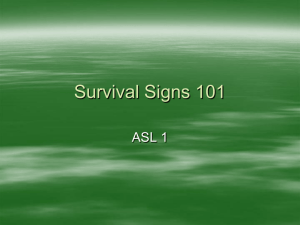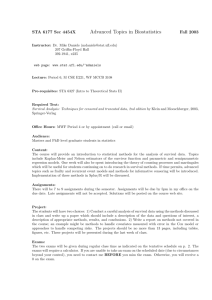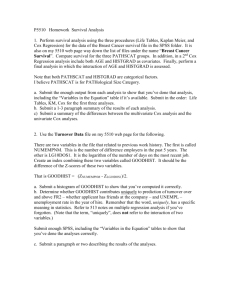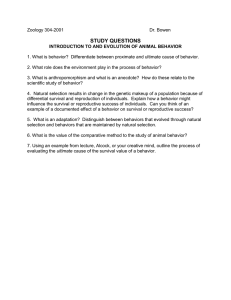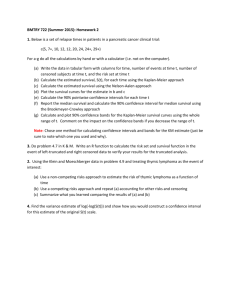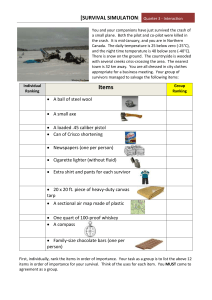STA 6177 / PHC 6937: Applied Survival Analysis Instructor: Fall, 2015
advertisement
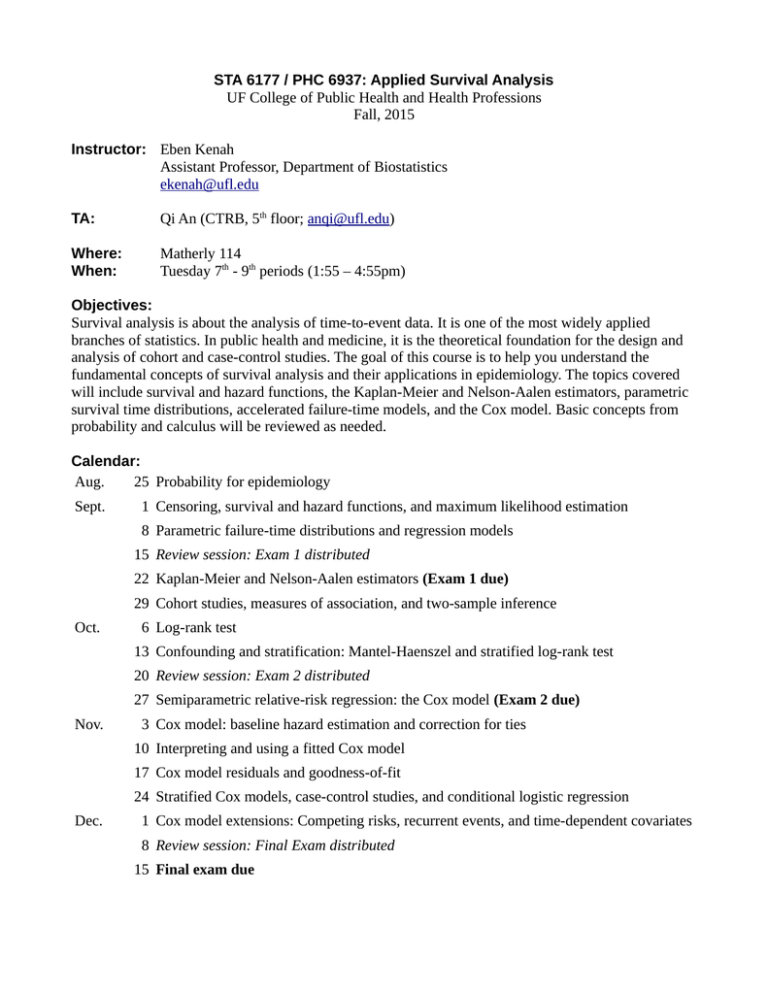
STA 6177 / PHC 6937: Applied Survival Analysis UF College of Public Health and Health Professions Fall, 2015 Instructor: Eben Kenah Assistant Professor, Department of Biostatistics ekenah@ufl.edu TA: Qi An (CTRB, 5th floor; anqi@ufl.edu) Where: When: Matherly 114 Tuesday 7th - 9th periods (1:55 – 4:55pm) Objectives: Survival analysis is about the analysis of time-to-event data. It is one of the most widely applied branches of statistics. In public health and medicine, it is the theoretical foundation for the design and analysis of cohort and case-control studies. The goal of this course is to help you understand the fundamental concepts of survival analysis and their applications in epidemiology. The topics covered will include survival and hazard functions, the Kaplan-Meier and Nelson-Aalen estimators, parametric survival time distributions, accelerated failure-time models, and the Cox model. Basic concepts from probability and calculus will be reviewed as needed. Calendar: Aug. 25 Probability for epidemiology Sept. 1 Censoring, survival and hazard functions, and maximum likelihood estimation 8 Parametric failure-time distributions and regression models 15 Review session: Exam 1 distributed 22 Kaplan-Meier and Nelson-Aalen estimators (Exam 1 due) 29 Cohort studies, measures of association, and two-sample inference Oct. 6 Log-rank test 13 Confounding and stratification: Mantel-Haenszel and stratified log-rank test 20 Review session: Exam 2 distributed 27 Semiparametric relative-risk regression: the Cox model (Exam 2 due) Nov. 3 Cox model: baseline hazard estimation and correction for ties 10 Interpreting and using a fitted Cox model 17 Cox model residuals and goodness-of-fit 24 Stratified Cox models, case-control studies, and conditional logistic regression Dec. 1 Cox model extensions: Competing risks, recurrent events, and time-dependent covariates 8 Review session: Final Exam distributed 15 Final exam due Class format and website: The first hour of each class will be devoted to discussing solutions to the previous week's problem set or exam. The second hour will be presentation of new material. The third hour will be an office hour for individual questions and group work on problem sets. There will be a class website available through UF e-Learning. You will need to sign in with your Gatorlink ID and password. Lecture notes, solutions sets, and other documents will be posted here. Problem sets: Problem sets will be given each week unless there is an exam. They will not be graded, but they will important for learning the material and preparing for the exams. You are encouraged to work together, but you must write up your own results. You are strongly encouraged to type your solutions. You may be called on to present solutions to the problems in class. Exams: There will be two midterm exams and one final exam. You must work on exams alone, type your solutions, and submit a hard copy at the beginning of class on the due date. If you need to submit electronically, please obtain permission ahead of time. Readings: There is no required textbook for the course. The primary readings will be course notes, including solution sets. A recommended textbook for epidemiology is Epidemiology: An Introduction by Kenneth J. Rothman (Oxford University Press, 2012). Good basic textbooks on survival analysis are: Applied Survival Analysis, 2nd edition by David W. Hosmer, Stanley Lemeshow, and Susanne May (WileyInterscience, 2008) or Survival Analysis Using SAS: A Practical Guide, 2nd edition by Paul D. Allison (SAS Press, 2012). More advanced textbooks that cover the class material are: The Statistical Analysis of Failure Time Data (2nd Edition) by John D. Kalbfleisch and Ross L. Prentice (Wiley Series in Probability and Statistics, 2002), Survival and Event History Analysis: A Process Point of View by Odd Aalen, Ørnulf Borgan, and Håkon Gjessing (Springer-Verlag, 2008), and Modeling Survival Data: Extending the Cox Model by Terry M. Therneau and Patricia M. Grambsch (Springer-Verlag, 2000). Software: All statistical computing in the class will be done in R (https://cran.r-project.org/). An introduction to R is available online (https://cran.r-project.org/doc/manuals/R-intro.pdf). Many of the functions we use will be in the survival package (https://cran.r-project.org/web/packages/survival/survival.pdf). From within R, this can be installed using the command: install.packages(“survival”). Grading: 15% Class participation 25% Exam 1 (due September 22) 25% Exam 2 (due October 27) 35% Final Exam (due December 15)
